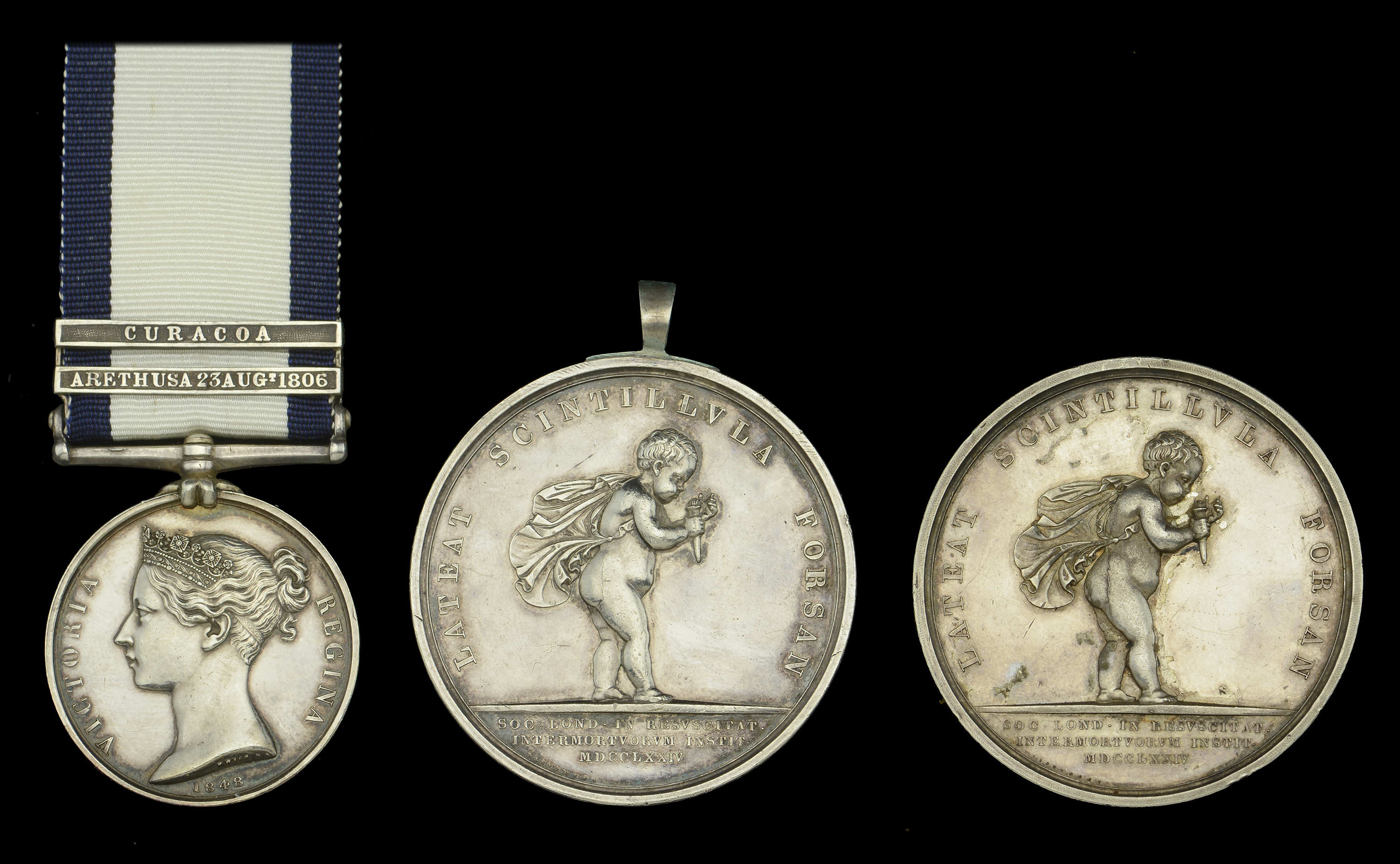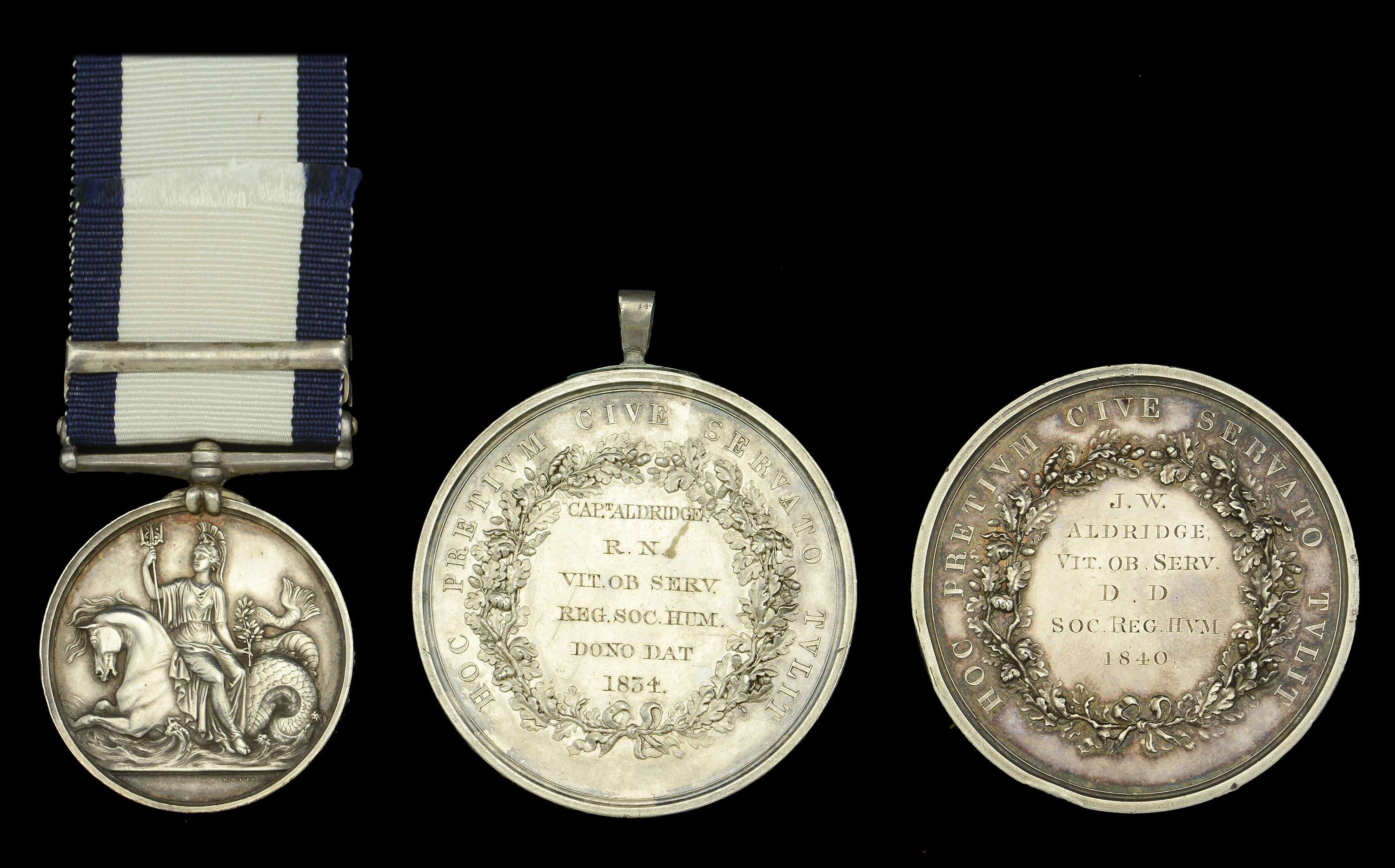The Naval General Service medal awarded to Captain John W. Aldridge, Royal Navy, a Midshipman in the Arethusa at the destruction of the Spanish frigate Pomona in August 1806, and at the capture of the Spanish settlement of Curacoa in January 1807; during his later career he saved many lives around the world and was twice honoured by the Royal Humane Society Naval General Service 1793-1840, two clasps, Arethusa 23 Augt. 1806, Curacoa (John W. Aldridge Midshipman.); Royal Humane Society Medal, large 51mm., 2nd type, silver, successful, the reverse officially inscribed, ‘Capt. Aldridge, R.N., 1834’, fitted with contemporary loop suspension; another similar, the reverse officially inscribed, ‘J. W. Aldridge, 1840’, two edge bruises to the last, otherwise good very fine and better (3) £8,000-£10,000 --- Importation Duty This lot is subject to importation duty of 5% on the hammer price unless exported outside the UK --- --- Provenance: Spink, July 2000. The rolls confirm John Williams Aldridge as a Midshipman aboard the Arethusa for the action of 23 August 1806, and in the same capacity for the capture of the Island of Curacoa on 1 January 1807, one of just 17 and 62 recipients of these clasps respectively recorded on the Admiralty roll. John Williams Aldridge entered the Royal Navy as a First-class Volunteer aboard H.M.S. Arethusa in September 1805. He subsequently saw action in her at the destruction of the Spanish Frigate Pomona, under the guns of Morro Castle, Havana, on 23 August 1806, when the latter hauled down her Colours after ‘35 minutes hot fighting’, with a loss of 20 killed and 30 wounded. The Arethusa had 2 men killed and another 30 wounded. Later, in the same action, 9 enemy Gunboats were destroyed and another 3 driven ashore. Aldridge was once again in action with the Arethusa, in company with other ships, at the taking of Curacoa in January 1807: ‘One of the most gallant actions of the War was the capture of the Spanish Settlement at Curacoa, on 1 January [1807], by a British Squadron of four Frigates - Arethusa 38, Captain Charles Brisbane, Latona 38, Captain Wood, Anson 44, Captain Lydiard; and the Fisgard 38, Captain Bolton. The entrance to the harbour of Curacoa is only 50 fathoms wide, while Fort Amsterdam, the chief work forming its defence, mounted 60 guns; there were also in the harbour the 36-gun Frigate Halstaar and the 20-gun Corvette Surinam. Soon after daylight, the Squadron anchored close to the forts and shipping, the “saucy” Arethusa bringing-to with her jib boom over the wall of the town. As a summons to surrender in ‘five minutes’ was not complied with, the Squadron opened fire at 6.15 a.m., and after the third broadside Captain Brisbane, at the head of his men, boarded and carried the Dutch Frigate, Captain Lydiard at the same time capturing the Surinam. Pulling ashore, the two gallant Officers led their men against Fort Amsterdam and, although it was manned with 270 soldiers, the sailors scaled the walls, and in ten minutes the British Flag was floating over this formidable work. Fire was now opened on Fort Republique, which was situated on a high hill, and commanded the town; and before noon, this and other small forts, together with the entire island, were in the hands of Captain Brisbane. The British loss was only 17, while the Danes had 200 killed and wounded. Captain Brisbane was deservedly knighted for this most glorious achievement, and the three other Captains received Medals, the First Lieutenants being promoted to Commanders’ (Great Battles of the British Navy, by Lieutenant C. R. Low, R.N., refers). From October 1808 until May 1813, Aldridge served in the Blake, initially under his old commander, Captain Sir Charles Brisbane, and afterwards under Sir Edward Codrington. With the latter he took part in the expedition to Flushing, served in the Gunboat Service in the defence of Cadiz, and participated in most of the operations of the period on the coastline of Catalonia. On next removing to the Rippon as a Master’s Mate, he was present at the capture of the French Frigate Le Weser and, in February 1815, while serving in the Prince, was advanced to Lieutenant. His post-Napoleonic War career encompassed many more seagoing appointments, both in U.K. waters and abroad, during the course of which he was awarded his Royal Humane Society Medals: ‘In January 1834 he received a Letter of Thanks and a Silver Medal for his conduct in having jumped overboard on three distinct occasions - 16 May 1814 in the River Garonne; 13 August 1828, on the coast of Candia; and in February 1833, on the Western Coast of Mexico - and saved the lives of as many men. A similar compliment was paid to him in July 1840, for the manner in which he had dashed, on 4 October 1839, from the poop of the Pembroke and rescued a fourth seaman’ (O’Byrne’s Naval Biography refers). Advanced to Commander in November 1833 and to Captain in November 1841, Aldridge was placed on the Retired List in December 1855.









